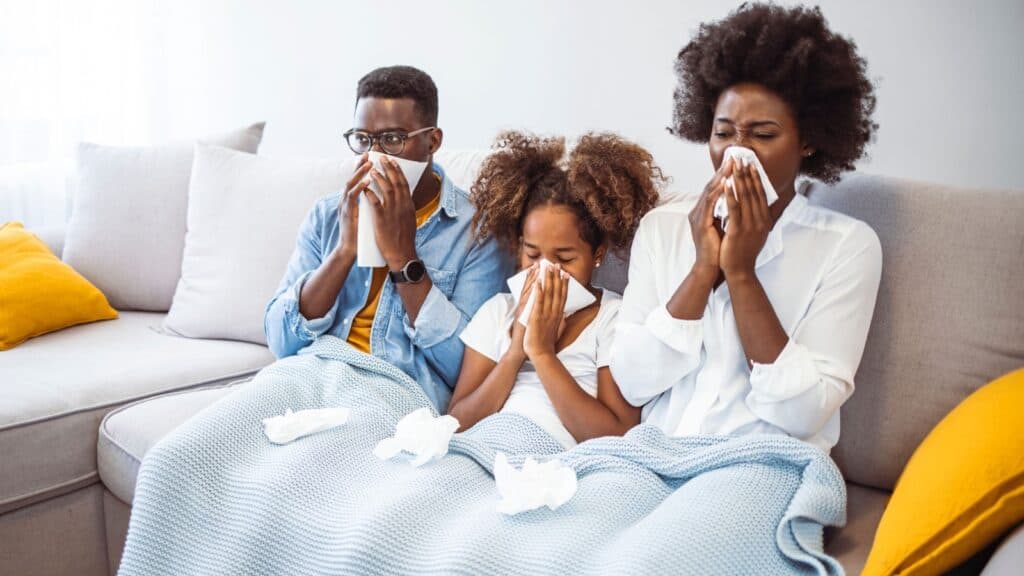Allergies, Cold, or COVID-19? How to Accurately Identify Your Symptoms
Distinguishing between allergies, a common cold, and COVID-19 can be quite challenging due to overlapping symptoms. Understanding these differences is crucial for proper treatment and prevention. This guide will help you identify your symptoms accurately and provide tips on how to manage them effectively.
The COVID-19 pandemic has made it more important than ever to accurately identify respiratory symptoms. Whether it’s a seasonal allergy, a common cold, or COVID-19, knowing what you’re dealing with can help you take the right actions.
Problem: Confusing Symptoms

The symptoms of allergies, colds, and COVID-19 often overlap, leading to confusion and potential misdiagnosis.
Consequences of Misdiagnosis

Misunderstanding your symptoms can lead to improper treatment, unnecessary anxiety, or a delay in receiving the care you need.
Solution: Clear Identification and Management

By clearly identifying your symptoms, you can manage your health more effectively and take appropriate measures to protect yourself and others.
Differences Between Allergies, Cold, and COVID-19

Here are common symptoms and their meanings:
Allergies

- Symptoms: Sneezing, runny or stuffy nose, itchy or watery eyes, post-nasal drip, mild fatigue.
- Characteristics: Symptoms persist as long as you are exposed to allergens such as pollen, dust, or pet dander. Allergies are not contagious.
Can Allergies Cause A Fever?

No, allergies do not cause a fever. Fever is more common with infections like colds or COVID-19.
Common Cold

- Symptoms: Runny or stuffy nose, sore throat, cough, congestion, slight body aches, mild fatigue, sneezing.
- Characteristics: Symptoms usually develop gradually and resolve within 7-10 days. Colds are caused by viruses and are contagious.
How Long Do Cold Symptoms Last?

Cold symptoms typically last 7-10 days. If symptoms persist longer, consult a healthcare provider.
COVID-19

- Symptoms: Fever, dry cough, shortness of breath, fatigue, body aches, loss of taste or smell, sore throat, congestion, nausea, diarrhea.
- Characteristics: Symptoms can appear 2-14 days after exposure to the virus. COVID-19 can range from mild to severe and is highly contagious.
Is A Loss Of Taste Or Smell Always Indicative Of COVID-19?

While a loss of taste or smell is common with COVID-19, it can occasionally occur with other infections. Testing is the best way to confirm.
Key Differences to Note

Here are some key differences to help you differentiate.
- Fever: Common in COVID-19 and flu, rare in colds, absent in allergies.
- Itchy/Watery Eyes: Typical of allergies, not usually seen in colds or COVID-19.
- Loss of Taste or Smell: A hallmark of COVID-19, especially early on without nasal congestion.
- Duration: Allergy symptoms last as long as you are exposed to allergens. Cold symptoms usually resolve within a week. COVID-19 symptoms can vary but often last longer and can lead to severe complications.
Can I Have Allergies And COVID-19 At The Same Time?

Yes, it is possible to have both conditions simultaneously. If you experience typical allergy symptoms along with new symptoms like fever or loss of taste/smell, get tested for COVID-19.
What Should I Do If My Symptoms Worsen?

Seek medical attention if you experience severe symptoms such as difficulty breathing, chest pain, confusion, or bluish lips or face.
Managing Your Symptoms

For Allergies:
- Medications: Antihistamines, nasal steroids, decongestants.
- Prevention: Avoid known allergens, use air purifiers, keep windows closed during high pollen seasons.
For Colds:
- Medications: Over-the-counter pain relievers, decongestants, cough syrups.
- Home Remedies: Rest, stay hydrated, use a humidifier, saline nasal sprays.
For COVID-19
- Medications: Consult a healthcare provider for antiviral treatments.
- Prevention: Get vaccinated, wear masks in crowded places, practice good hand hygiene, maintain social distancing.
The Takeaway

Understanding the differences between allergies, colds, and COVID-19 can help you manage your health more effectively. Recognize the symptoms, take preventive measures, and seek medical advice when necessary to ensure you and your loved ones stay healthy.
Are You At Risk For Shingles? Expert Insights And Prevention Tips You Can’t Miss!

Shingles, also known as herpes zoster, is a viral infection that results in a painful rash. It is caused by the varicella-zoster virus, the same virus that causes chickenpox. After a person recovers from chickenpox, the virus can remain dormant in the body and reactivate years later as shingles.
READ: Are You At Risk For Shingles? Expert Insights And Prevention Tips You Can’t Miss!
Science Tells Us What To Expect As We Age: Strategies For Thriving In Later Life

that pertain to us all. Aging gradually alters people over decades, a long period shaped by individuals’ economic and social circumstances, their behaviors, their neighborhoods, and other factors. Also, while people experience common physiological issues in later life, they don’t follow a well-charted, developmentally predetermined path. Let’s take a look at what science has told us to expect. READ: Science Tells Us What To Expect As We Age: Strategies For Thriving In Later Life
Join Us

Join us on this empowering journey as we explore, celebrate, and elevate “her story.” The Queen Zone is not just a platform; it’s a community where women from all walks of life can come together, share their experiences, and inspire one another. Welcome to a space where the female experience takes center stage. Sign up for our newsletter so you don’t miss a thing, Queen!







